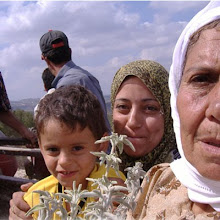I had intended to write about something else THIS time, but once again yesterday I encountered the high and low of life here within a couple of hours.
I started the day in Salfeet where I had been for the last three days meeting old friends from Salfeet Friends of Watford and discussing plans for the future. Those of you in Watford will be glad to hear that plans for our project for musical and cultural education in Salfeet are progressing well—news to follow soon—and that our Salfeet friends sent their best wishes to you all.
The highlight of the morning was a visit to Abdul's kindergarten in the village of Kifr Dik. There are three of these. They are for pre-school children and parents pay—in Abdul's case, about £10 per month, although as he said, parents can't necessarily pay every month. Abdul's kindergarten is different. He has built it himself in his garden: three classrooms, with toilet and a playground. It's just like any nursery school in the UK: rows of desks with lots of small beaming faces, pictures on the wall, and English and Arabic alphabets displayed. It's overcrowded because it's so popular. He and his wife teach all subjects but also music—he himself plays the Arab lute, and his teenage son is an accomplished singer and performer on keyboard. So, as happened when Keith and I were there 15 months ago, I was treated to a class singing songs with Abdul walking around the room leading on his lute. His love and enthusiasm for these little people and their enthusiasm, energy and singing were lovely to see and hear. I then sat with him in the sunshine in the garden while he explained how much he wants to build a bigger school so that he can teach more children.
An hour later as I was leaving to catch the minibus back to Jayous I got a phone call—everyone has a mobile and EAs are instructed to keep theirs on at all times. This was news of a house demolition in a village called Harith which was on the route of the minibus towards Jayous. So I got off at Harith, and an old man in a very battered old taxi took me to the far end of a quite large village. And there it was: what was a house until the Israeli army arrived two hours before was now a tangled pile of metal wires and broken concrete in front of a lovely terraced olive grove. I had read of house demolitions, and seen films of them taking place, but it's different when you actually see a destroyed house. This house had just been completed, and the family was due to move in in the next week or two. In that sense it was less appalling than usual when a home—not just a house—is demolished, very often with most of the family possessions inside because the Israeli army turns up with no notice, and observers find the family sitting outside trying to get over the shock of what's just happened to them. But as someone said to me this morning, that house was someone's dream and the family worked for 5 years to achieve it. In this village of perhaps 4000 people, several homes have recently been demolished, and 25 have had demolition orders served upon them. This means that at any time, tomorrow, next week or next year a bulldozer will turn up early one morning and destroy your house. The anxiety and lack of security that this causes to the family and especially the children—50% of those affected by house demolitions are children—can only be imagined. Why does Israel carry on with this inhuman policy—remember that this is occupied territory, and such a policy contravenes various human rights and Geneva Convention provisions specifically those relating to protection of an occupied population and discrimination? The answer is that this and other houses here and in other places were built in contravention of Israel's zoning and permit laws which prevent Palestinian villages from expanding to allow for the growth of their population. By contrast Israel's own settlements on occupied Palestinian territory are encouraged to expand for their growing and illegal populations. It's reasonable to ask, of course, why Palestinians build a house when they know there is a risk of it being demolished. The answer is the usual "between rock and hard place" situation: they know they will never be able to obtain a permit from Israel to expand their old house or build their new house, but their family is expanding or they want to get married and start a new home—the custom here—and they feel they have no choice.
The Israeli Committee Against House Demolitions (ICHAD) estimates that over 24,000 houses have been demolished in the West Bank, East Jerusalem and Gaza since Israel conquered these territories in 1967. If each house contained 7 people, this amounts to around 170,000 people affected, many of them children, in a 2005 population of about 3.8 million. To put this into context, the equivalent for the UK population of about 60 million would be 360,000 houses destroyed with an affected population of around 2.5 million. See www.icahd.org and www.procon.org.
Mike Barnes
15 April 2010


No comments:
Post a Comment